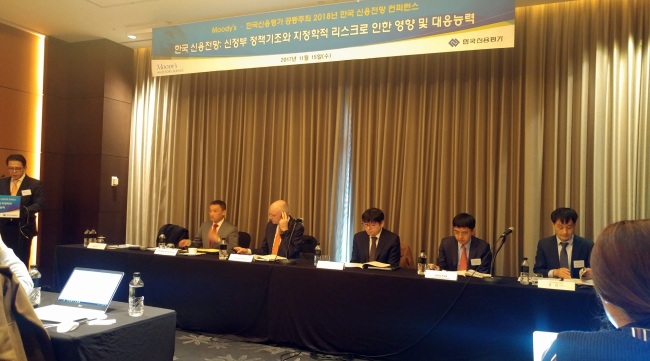Global ratings agency Moody’s on Wednesday forecast that South Korea’s economic growth and its companies’ credit conditions will remain stable in 2018 on the back of synchronized growth throughout the globe.
“For the first time since the global financial crisis, we expect growth in all major areas next year,” Christian de Guzman, vice president and senior credit officer of Moody’s sovereign risk group, said in a media briefing.
The press event, held jointly by Moody’s and its local subsidiary Korea Investors Service, took place ahead of the 15th annual Korea Credit Outlook Conference, one of the key investment benchmarks here.
 |
Global ratings agency Moody's and its affiliate Korea Investors Service on Wednesday hold their 15th annual Korea Credit Outlook Conference at Conrad Seoul. (Bae Hyun-jung/The Korea Herald) |
It was the trade-dependent Asian region, especially South Korea, which is likely to benefit the most from such global economic upturn, according to the senior official.
“We are looking at robust consumption and an upturn in investment, which allows the government here to pursue its reform agendas for inclusive growth and to address issues such as household debts.”
Last month, Moody’s kept Seoul’s credit rating at Aa2, citing its strong economic resilience and fiscal soundness, as well as the Moon Jae-in government’s transparent policies. Beijing and Tokyo stood two notches below Seoul, at Aa1.
The agency also raised the country’s gross domestic product forecast for this year to 3 percent from the previous 2.8 percent.
As for concerns the recently growing economic optimism may be exaggerated, Guzman said South Korea has reason to look forward to sustained growth pivoting on strong exports.
“The indexes earlier this year were already incorporating the (positive) base effects which started to appear from the end of last year,” he said.
“Also, we expect that the global demands for semiconductors and other electronic goods will remain strong.”
It was the geopolitical risks concerning North Korea which raised some concerns from market observers.
“The escalation of military tensions on the Korean Peninsula could complicate implications not only for sovereigns in the Asian region but for the world in general,” Guzman said.
The agency nevertheless maintained its favorable view upon South Korea’s economic growth and its banking industry.
“We did change our assessment of Korea’s susceptibility to event risk based on the given input,” said Graeme Knowd, managing director for the financial institutions group at Moody’s.
“But Korea’s economic growth has been growing above previous expectations and its banks are in good shape in terms of asset quality and risk response capacity, especially compared to other peer developed countries.”
Local experts also believe the gap between industries will widen further, suggesting the semiconductor, oil refinery and chemical industries will continue their current uptrend while the automobile and distribution sectors will likely face a profit decline.
“The distribution and automobile sectors had displayed a cascading downward trend due to increased competition and general change in consumption patterns, even before the THAAD issue came along,” said Yoo Kon, head of corporate finance group at KIS.
A monthslong conflict persisted between Seoul and Beijing earlier this year, following the former’s decision to deploy the advanced US missile defense system here.
Song Byung-woon, head of financial institutions group at KIS, brought attention on the issue of large investment banks. The Financial Services Commission on Monday granted licenses to five local brokerages to start investment banking, allowing top-tier securities companies to extend their business.
“The expansion of capital by these brokerages has been boosting expectations in the market, but has also increased the level of incorporated risks,” Song said.
There is also the possibility that these top-cap brokerages may monopolize the market and infringe on the market portion of smaller players, despite the government’s expectation they will move to new sectors and expand the overall securities business.
By Bae Hyun-jung (
tellme@heraldcorp.com)








